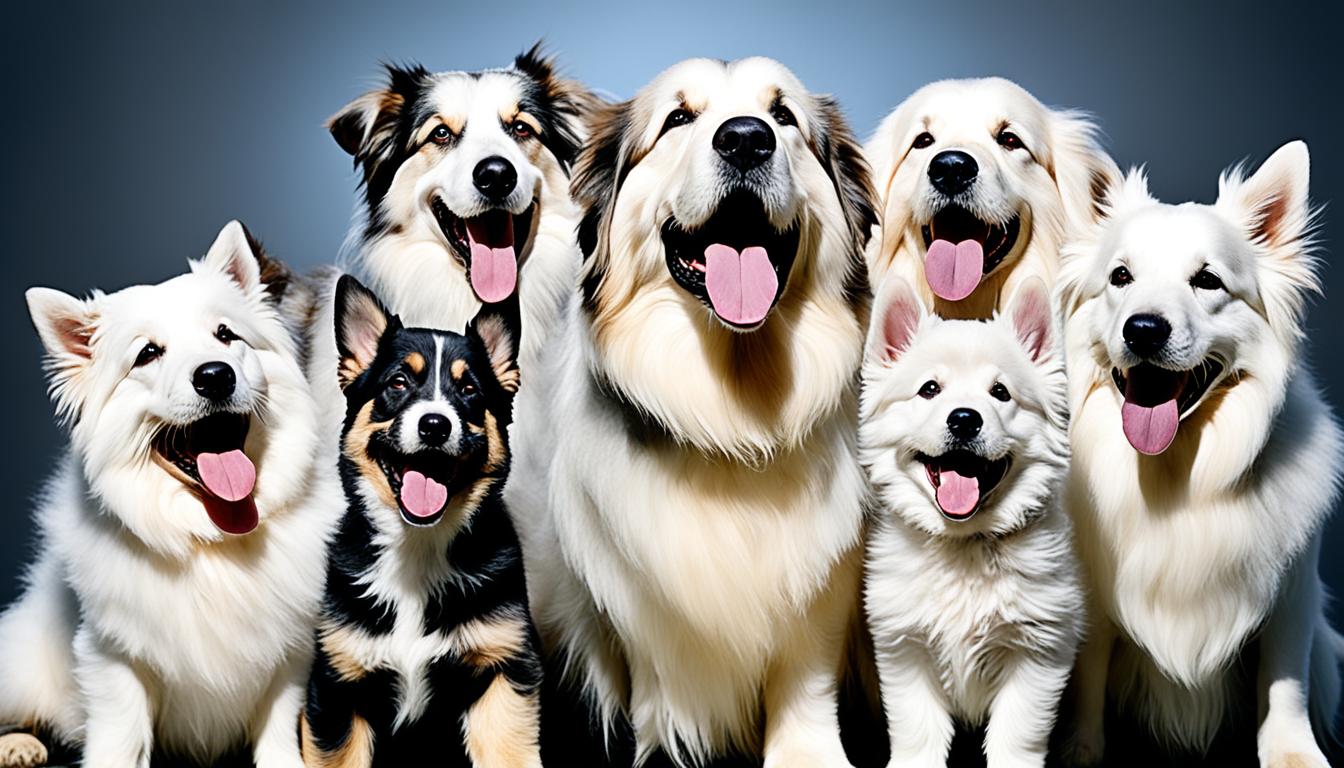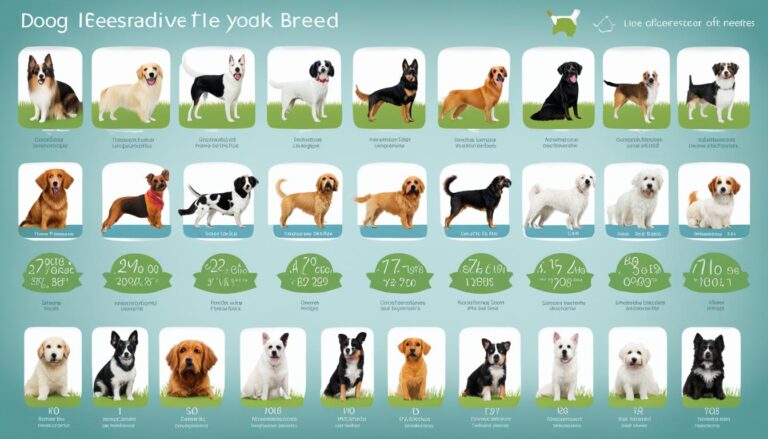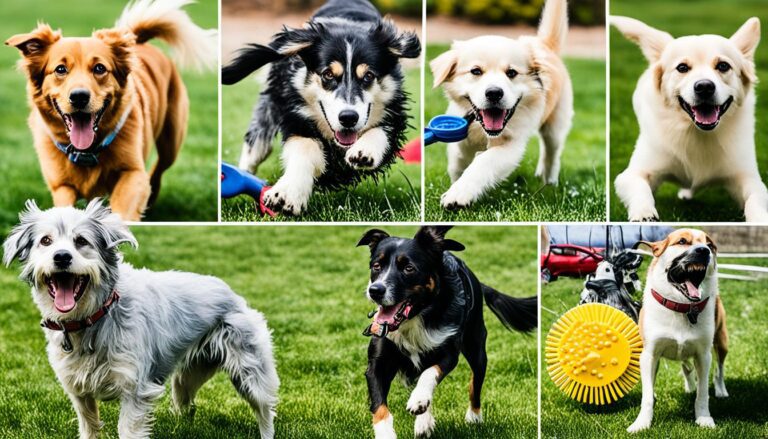Top Vocal Dog Breeds That Bark Frequently
When it comes to vocal dog breeds, there are those that have a tendency to bark…a lot! If you’re considering bringing a furry friend into your home, it’s important to be aware of the breeds that are known for their frequent barking tendencies. These dogs can be quite noisy and may require specific training and management to keep their barking in check.
In this article, we will explore some of the top vocal dog breeds that bark frequently. Whether you’re a first-time dog owner or a seasoned pet parent, understanding the different breeds and their barking habits can help you make an informed decision and ensure a harmonious living environment for you and your furry companion.
Key Takeaways:
- Top vocal dog breeds are known for their frequent barking tendencies.
- These breeds may require specific training and management to control excessive barking.
- Understanding breed-specific traits can help you make an informed decision when choosing a dog.
- Consistent training and positive reinforcement techniques can help curb excessive barking in vocal dog breeds.
- It’s important to provide mental and physical stimulation for dogs prone to excessive barking.
Other Talkative Dog Breeds Under 25 Pounds
If you’re looking for a small dog breed that’s big on vocalization, here are some talkative breeds that weigh under 25 pounds:
1. Chihuahua
Known for their fiery personality, Chihuahuas are fearless and vocal. These pint-sized pups have a lot to say and aren’t afraid to express themselves with their signature high-pitched bark.
2. Pomeranian
Pomeranians may be fluffy and adorable, but they are also full of energy and have a tendency to bark. They often use their voice to let everyone know their presence.
3. Yorkshire Terrier
Yorkies may be small in size, but they have big personalities. These affectionate little dogs love to communicate with their owners and can become quite vocal when excited or anxious.
4. Shih Tzu
Shih Tzus are known for their friendly and outgoing nature. However, they can also be quite chatty and will bark to alert their owners of any perceived threats or changes in their environment.
5. Maltese
Maltese dogs are known for their silky white coats and playful personalities. They love to vocalize and use their voice to get attention or express their feelings.
These talkative small breeds require proper training and socialization to help manage their barking tendencies. It’s important to understand that barking is a natural behavior for dogs, and with consistent guidance, you can help them learn when it is appropriate to use their voice and when to be quiet.
Tips for Dealing with Vocal Dog Breeds
If you have a vocal dog breed, it’s important to understand that managing their excessive barking requires consistent training and effective management strategies. By following these simple tips, you can reduce their barking tendencies and create a more peaceful environment for both you and your furry friend.
1. Establish a Routine: Consistency is key when dealing with vocal dogs. Establish a daily routine that includes regular exercise, feeding times, and training sessions to keep them mentally and physically stimulated. A tired dog is less likely to bark excessively.
2. Reward Quiet Behavior: When your dog is quiet and not barking excessively, reward them with treats, verbal praise, or a favorite toy. Positive reinforcement will help reinforce the idea that quiet behavior is desirable.
3. Crate Training: Using a crate can provide a safe and comfortable space for your dog while also helping to reduce their barking. Make sure the crate is appropriately sized and include familiar bedding and toys to create a cozy environment.
4. Provide Mental Stimulation: Vocal dogs often bark out of boredom or frustration. Keep them mentally stimulated by offering interactive toys, puzzles, and training activities that challenge their problem-solving skills. Mental exhaustion can help curb barking tendencies.
5. Seek Professional Help: If your efforts to manage your vocal dog’s barking are not effective, it may be beneficial to consult with a professional dog trainer or behaviorist. They can provide expert guidance and tailored techniques to address your dog’s specific needs.
By implementing these tips, you can effectively manage your vocal dog’s excessive barking and create a harmonious living environment. Remember, each dog is unique, so it’s essential to be patient and consistent in your training efforts. With time and practice, you can help your dog become a quieter and more content companion.
FAQ
What are some top vocal dog breeds that bark frequently?
Some top vocal dog breeds that are known for their frequent barking tendencies include the Beagle, Chihuahua, Dachshund, Shih Tzu, Siberian Husky, and Terrier breeds.
Are there other talkative dog breeds that weigh under 25 pounds?
Yes, there are other talkative dog breeds that weigh under 25 pounds. Some examples include the Bichon Frise, Cairn Terrier, Cavalier King Charles Spaniel, Pomeranian, and Yorkshire Terrier.
How can I deal with vocal dog breeds that bark a lot?
Dealing with vocal dog breeds requires consistent training and management. Here are some tips to help:
1. Identify the triggers: Determine what makes your dog bark excessively and try to minimize or eliminate those triggers.
2. Positive reinforcement training: Use positive reinforcement techniques, such as rewards and treats, to encourage quiet behavior.
3. Engage in regular exercise: Ensure that your vocal dog gets enough physical and mental stimulation through regular exercise and playtime.
4. Provide mental stimulation: Use puzzle toys, interactive games, and training sessions to keep your dog mentally engaged.
5. Establish a consistent routine: Dogs thrive on routine, so establish a consistent schedule for feeding, exercise, and rest to help reduce anxiety and excessive barking.
6. Seek professional help: If your dog’s excessive barking persists despite your best efforts, consider consulting a professional dog trainer or behaviorist for specialized guidance.







